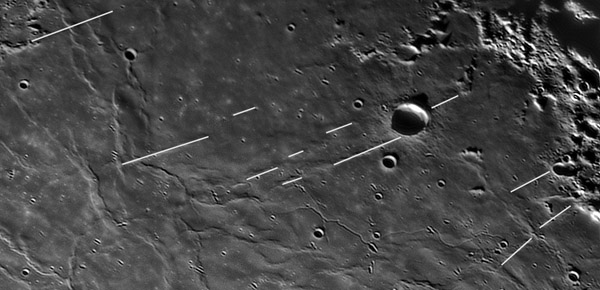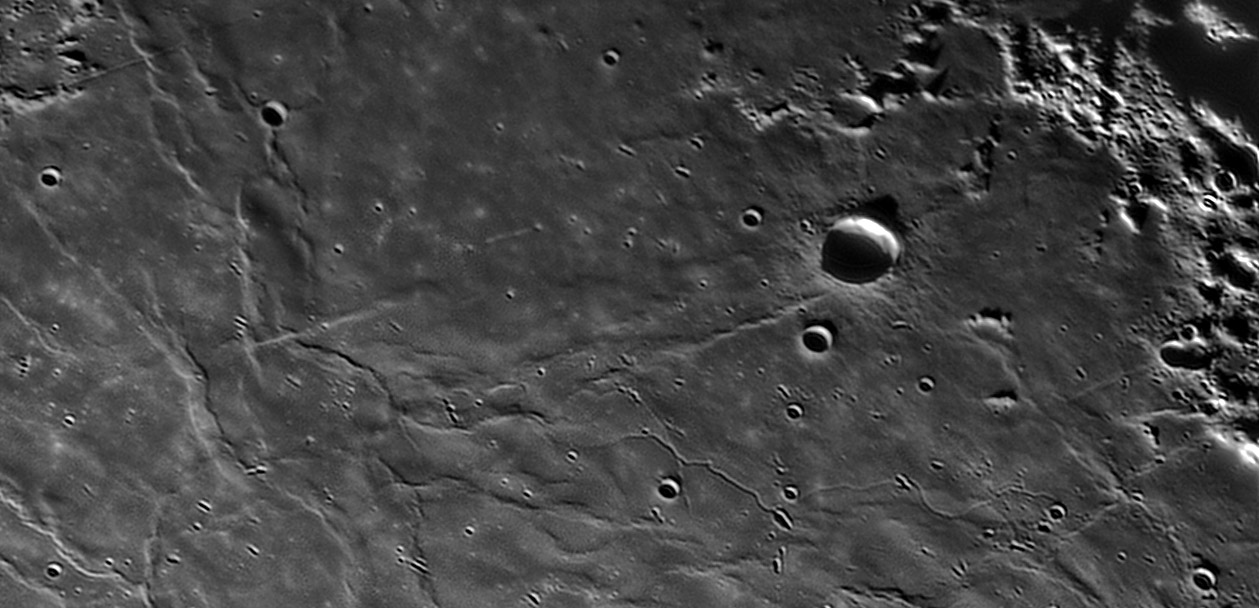Difference between revisions of "August 21, 2012"
(Created page with "__NOTOC__ =Linears= <!-- ws:start:WikiTextHeadingRule:0:<h1> --> <!-- ws:start:WikiTextLocalImageRule:14:<img src="/file/view/LPOD-Aug21-12.jpg/358847045/LPO...") |
|||
| Line 7: | Line 7: | ||
<br /> | <br /> | ||
| + | <table class="wiki_table"> | ||
| + | <tr> | ||
| + | <td><!-- ws:start:WikiTextLocalImageRule:15:<img src="/file/view/LPOD-Aug21b-12.jpg/358847117/LPOD-Aug21b-12.jpg" alt="" title="" /> -->[[File:LPOD-Aug21b-12.jpg|LPOD-Aug21b-12.jpg]]<!-- ws:end:WikiTextLocalImageRule:15 --><br /> | ||
</td> | </td> | ||
<td>Looking at George's great image of eastern Tranquillitatis your eye is captured by the sinuous rille snaking across the mare surface. This feature was famously named in a planning [http://lpod.wikispaces.com/May+8%2C+2011 map] for Apollo 11. The rille in the center was informally named Diamondback Rille, and the one that extends to the right was called Sidewinder Rille. The LRO QuickMap shows that this is actually one continuous rille so there is one name too many. But what caught my eye was the series of parallel straight features that I have marked in white on the small image. The ones near the shadowed crater Maskelyne are ridges but two others are rilles - at top left and another at top right. Some of these linear features are radial to Lamont but as a group they are not, although they are generally radial to the Imbrium Basin. If these features are related to Imbrium we really don't know exactly how stresses or forces from the impact cause ridges and rilles far away. <br /> | <td>Looking at George's great image of eastern Tranquillitatis your eye is captured by the sinuous rille snaking across the mare surface. This feature was famously named in a planning [http://lpod.wikispaces.com/May+8%2C+2011 map] for Apollo 11. The rille in the center was informally named Diamondback Rille, and the one that extends to the right was called Sidewinder Rille. The LRO QuickMap shows that this is actually one continuous rille so there is one name too many. But what caught my eye was the series of parallel straight features that I have marked in white on the small image. The ones near the shadowed crater Maskelyne are ridges but two others are rilles - at top left and another at top right. Some of these linear features are radial to Lamont but as a group they are not, although they are generally radial to the Imbrium Basin. If these features are related to Imbrium we really don't know exactly how stresses or forces from the impact cause ridges and rilles far away. <br /> | ||
Revision as of 22:08, 1 January 2015
Linears
north to the left image by George Tarsoudis, Greece
 |
Looking at George's great image of eastern Tranquillitatis your eye is captured by the sinuous rille snaking across the mare surface. This feature was famously named in a planning map for Apollo 11. The rille in the center was informally named Diamondback Rille, and the one that extends to the right was called Sidewinder Rille. The LRO QuickMap shows that this is actually one continuous rille so there is one name too many. But what caught my eye was the series of parallel straight features that I have marked in white on the small image. The ones near the shadowed crater Maskelyne are ridges but two others are rilles - at top left and another at top right. Some of these linear features are radial to Lamont but as a group they are not, although they are generally radial to the Imbrium Basin. If these features are related to Imbrium we really don't know exactly how stresses or forces from the impact cause ridges and rilles far away.
|
George's website
COMMENTS?
Click on this icon File:PostIcon.jpg at the upper right to post a comment.




